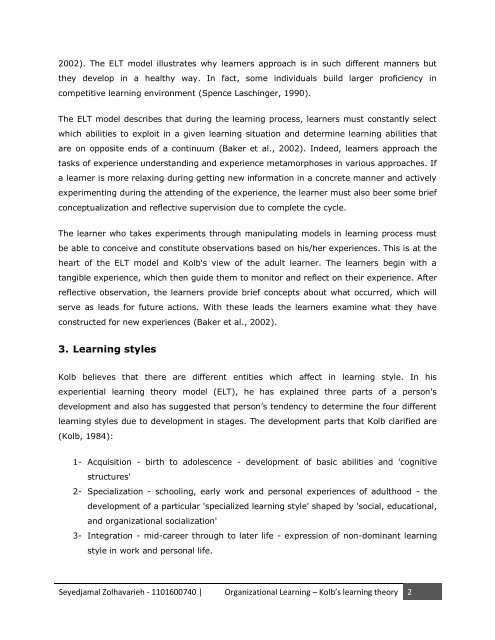1. David Kolb 2. Experiential learning theory (ELT)
1. David Kolb 2. Experiential learning theory (ELT)
1. David Kolb 2. Experiential learning theory (ELT)
You also want an ePaper? Increase the reach of your titles
YUMPU automatically turns print PDFs into web optimized ePapers that Google loves.
2002). The <strong>ELT</strong> model illustrates why learners approach is in such different manners but<br />
they develop in a healthy way. In fact, some individuals build larger proficiency in<br />
competitive <strong>learning</strong> environment (Spence Laschinger, 1990).<br />
The <strong>ELT</strong> model describes that during the <strong>learning</strong> process, learners must constantly select<br />
which abilities to exploit in a given <strong>learning</strong> situation and determine <strong>learning</strong> abilities that<br />
are on opposite ends of a continuum (Baker et al., 2002). Indeed, learners approach the<br />
tasks of experience understanding and experience metamorphoses in various approaches. If<br />
a learner is more relaxing during getting new information in a concrete manner and actively<br />
experimenting during the attending of the experience, the learner must also beer some brief<br />
conceptualization and reflective supervision due to complete the cycle.<br />
The learner who takes experiments through manipulating models in <strong>learning</strong> process must<br />
be able to conceive and constitute observations based on his/her experiences. This is at the<br />
heart of the <strong>ELT</strong> model and <strong>Kolb</strong>'s view of the adult learner. The learners begin with a<br />
tangible experience, which then guide them to monitor and reflect on their experience. After<br />
reflective observation, the learners provide brief concepts about what occurred, which will<br />
serve as leads for future actions. With these leads the learners examine what they have<br />
constructed for new experiences (Baker et al., 2002).<br />
3. Learning styles<br />
<strong>Kolb</strong> believes that there are different entities which affect in <strong>learning</strong> style. In his<br />
experiential <strong>learning</strong> <strong>theory</strong> model (<strong>ELT</strong>), he has explained three parts of a person's<br />
development and also has suggested that person’s tendency to determine the four different<br />
<strong>learning</strong> styles due to development in stages. The development parts that <strong>Kolb</strong> clarified are<br />
(<strong>Kolb</strong>, 1984):<br />
1- Acquisition - birth to adolescence - development of basic abilities and 'cognitive<br />
structures'<br />
2- Specialization - schooling, early work and personal experiences of adulthood - the<br />
development of a particular 'specialized <strong>learning</strong> style' shaped by 'social, educational,<br />
and organizational socialization'<br />
3- Integration - mid-career through to later life - expression of non-dominant <strong>learning</strong><br />
style in work and personal life.<br />
Seyedjamal Zolhavarieh - 1101600740 | Organizational Learning – <strong>Kolb</strong>’s <strong>learning</strong> <strong>theory</strong> 2


